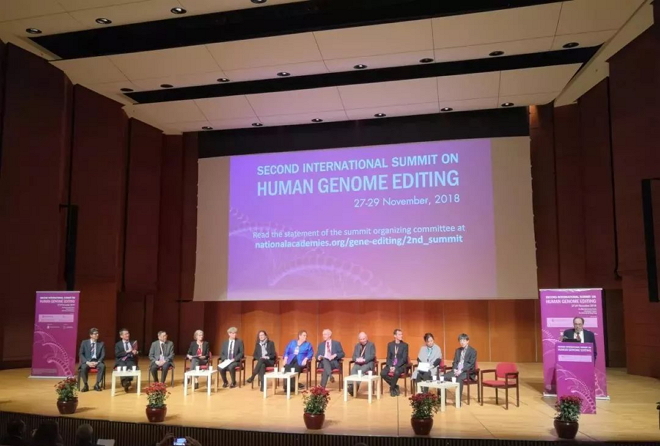
本文转载自“赛先生”,翻译:叶水送 邸利会,声明来源:峰会大会组委会。
2015年12月,美国国家科学院和美国国家医学院、英国皇家学会和中国科学院在华盛顿特区举办了一次国际峰会,讨论与人类基因组编辑相关的科学、伦理和监管问题。最后,峰会组委会发布了一份声明,确定了可在当前监管和治理协议范围内,可以进行的研究和临床应用。那时,该委员会还表示,进行任何可遗传的生殖细胞编辑临床使用是不负责任的。此外,它呼吁继续就这一快速发展的技术的潜在收益、风险和监督进行国际讨论。
作为致力于促进人类基因组编辑的深入和国际讨论的一部分,香港科学院、英国皇家学会、美国国家科学院和美国国家医学院组织了第二次香港人类基因组编辑国际峰会,评估不断发展的科学图景、可能的临床应用,以及随之而来的对人类基因组编辑的社会反应。虽然我们,第二次峰会的组委会,对体细胞基因编辑在临床试验中的迅速发展表示赞赏,但我们仍然认为,进行任何生殖细胞编辑的临床使用仍然是不负责任的。
人类基因组编辑研究
基础和临床前研究正在迅速推进体细胞和生殖细胞基因组编辑科学的发展。更好地理解和设计基因组编辑技术,包括碱基编辑技术,已经显著提高了效率和精确度,同时大大减少了脱靶事件的发生。正如预期的那样,现在,对患者体细胞基因组编辑正在测试之中。
改变胚胎或配子的DNA可以让携带致病突变的父母拥有健康的遗传上相连的孩子。然而,胚胎或配子的可遗传基因组编辑带来的风险仍然难以评估。人们担心基因编辑只发生在早期胚胎的某些细胞中,同时有未经编辑的细胞,这样会长期导致疾病。生殖细胞编辑不仅会对个体产生意想不到的有害影响,也会对个体的后代产生意想不到的有害影响。对特定性状的改变可能对其他性状产生意想不到的影响,这些性状可能因人而异并且响应环境影响。
遗传变化产生的影响的多样性使得难以对利益和风险进行全面评估。然而,如果这些风险得到解决并且符合许多其他标准,生殖细胞基因组编辑在未来可能会被接受。这些标准包括严格的独立监督、迫切的医疗需求、缺乏合理的替代方案,长期随访计划以及对社会影响的关注。即便如此,公众的可接受程度可能因司法管辖区而异,导致不同的政策反应。
组委会得出结论,临床实践的科学理解和技术要求仍然很不确定,且风险太大,无法在此时允许进行生殖细胞编辑的临床试验。然而,过去三年的进展以及本次峰会的讨论表明,现在是时候为这些试验确定严格、负责任的转化途径。
建议的转化途径
生殖细胞编辑的转化途径需要遵循广泛接受的临床研究标准,包括过去三年发表的基因组编辑指导文件中阐明的标准。[1] 这样的途径将需要建立临床前证据和基因修改的准确性的标准,临床试验从业者的能力评估,专业行为的可执行的标准,以及与患者和患者倡导团体的强有力的伙伴关系。
生殖细胞编辑的临床应用报告
在这次峰会上,我们听到一个意外且令人深感不安的说法,即人类胚胎已经过编辑和植入,导致一例怀孕和一对双胞胎的诞生。我们建议进行独立评估以验证此事,并确定所声称的DNA修饰是否已发生。即使基因修改得到验证,该试验也是不负责任的,不符合国际规范,其缺陷包括医学适应症不足,研究方案设计不合理,未能达到保护研究对象福利的伦理标准,且在临床试验的制定、审查和实施中缺乏透明度。
持续举行的国际论坛
组委会呼吁持续组织国际论坛,以促进广泛的公众对话,制定战略增加公平获取以满足没有得到足够服务的人口的需求,加快监管科学的发展,提供有关治理方案信息的交流平台,促进制定共同的监管标准,并通过计划中的和正在进行的实验的国际登记加强研究和临床应用的协调。
除了建立国际论坛外,组委会还呼吁世界各国的学术界和科学、医学的学习社区继续举办国际峰会,审查基因组编辑的临床应用,收集不同的观点,提供不同的观点,将决策者的决定告知(公众),制定建议和指导方针,以及促进国家间、司法管辖区之间的协调。
参考资料:
See, for example, National Academies of Sciences, Engineering, and Medicine, Human Genome Editing: Science, Ethics, and Governance (Washington, DC: The National Academies Press, 2017) and Nuffield Council on Bioethics, Genome Editing and Human Reproduction (London: Nuffield Council on Bioethics, 2018).
文章头图及封面图片:人类基因组编辑国际峰会大会现场(摄影 刘新星)
附:原文
On Human Genome Editing II
Statement by the Organizing Committee of the
Second International Summit on Human Genome Editing
November 29, 2018
In December 2015, the U.S. National Academy of Sciences and U.S. National Academy of Medicine, the Royal Society of the United Kingdom, and the Chinese Academy of Sciences hosted an international summit in Washington, D.C., to discuss scientific, ethical, and governance issues associated with human genome editing. At its conclusion, the summit organizing committee released a statement identifying areas of research and clinical use that could proceed within current regulatory and governance protocols. The committee also stated that it would be irresponsible to proceed with any clinical use of heritable "germline" editing at that time. Further, it called for continued international discussion of potential benefits, risks, and oversight of this rapidly advancing technology.
As part of their commitment to fostering in-depth and international discussion about human genome editing, the Academy of Sciences of Hong Kong, the Royal Society of the United Kingdom, and the U.S. National Academy of Sciences and U.S. National Academy of Medicine organized the Second International Summit on Human Genome Editing in Hong Kong to assess the evolving scientific landscape, possible clinical applications, and attendant societal reactions to human genome editing. While we, the organizing committee of the second summit, applaud the rapid advance of somatic gene editing into clinical trials, we continue to believe that proceeding with any clinical use of germline editing remains irresponsible at this time.
Human Genome Editing Research
Basic and preclinical research is rapidly advancing the science of somatic and germline genome editing. Better understanding and design of genome editing techniques, including base editing, have produced significant increases in efficiency and precision while greatly reducing off-target events. As was anticipated, somatic genome editing is now being tested in patients.
Making changes in the DNA of embryos or gametes could allow parents who carry disease-causing mutations to have healthy, genetically related children. However, heritable genome editing of either embryos or gametes poses risks that remain difficult to evaluate. Concerns persist that changes may be made in only some cells of early-stage embryos, leaving unedited cells to perpetuate a disease. Germline editing could produce unintended harmful effects for not just an individual but also for that individual’s descendants. Changes to a particular trait may have unanticipated effects on other traits that could vary from person to person and in response to environmental influences.
The variability of effects produced by genetic changes makes it difficult to conduct a thorough evaluation of benefits and risks. Nevertheless, germline genome editing could become acceptable in the future if these risks are addressed and if a number of additional criteria are met. These criteria include strict independent oversight, a compelling medical need, an absence of reasonable alternatives, a plan for long-term follow-up, and attention to societal effects. Even so, public acceptability will likely vary among jurisdictions, leading to differing policy responses.
The organizing committee concludes that the scientific understanding and technical requirements for clinical practice remain too uncertain and the risks too great to permit clinical trials of germline editing at this time. Progress over the last three years and the discussions at the current summit, however, suggest that it is time to define a rigorous, responsible translational pathway toward such trials.
A Proposed Translational Pathway
A translational pathway to germline editing will require adhering to widely accepted standards for clinical research, including criteria articulated in genome editing guidance documents published in the last three years.[1] Such a pathway will require establishing standards for preclinical evidence and accuracy of gene modification, assessment of competency for practitioners of clinical trials, enforceable standards of professional behavior, and strong partnerships with patients and patient advocacy groups.
Report of Clinical Use of Germline Editing
At this summit we heard an unexpected and deeply disturbing claim that human embryos had been edited and implanted, resulting in a pregnancy and the birth of twins. We recommend an independent assessment to verify this claim and to ascertain whether the claimed DNA modifications have occurred. Even if the modifications are verified, the procedure was irresponsible and failed to conform with international norms. Its flaws include an inadequate medical indication, a poorly designed study protocol, a failure to meet ethical standards for protecting the welfare of research subjects, and a lack of transparency in the development, review, and conduct of the clinical procedures.
An Ongoing International Forum
The organizing committee calls for an ongoing international forum to foster broad public dialogue, develop strategies for increasing equitable access to meet the needs of underserved populations, speed the development of regulatory science, provide a clearinghouse for information about governance options, contribute to the development of common regulatory standards, and enhance coordination of research and clinical applications through an international registry of planned and ongoing experiments.
In addition to the establishment of an international forum, the organizing committee calls upon national academies and learned societies of science and medicine around the world to continue the practice of holding international summits to review clinical uses of genome editing, to gather diverse perspectives, to inform decisions by policymakers, to formulate recommendations and guidelines, and to promote coordination among nations and jurisdictions.
[1] See, for example, National Academies of Sciences, Engineering, and Medicine, Human Genome Editing: Science, Ethics, and Governance (Washington, DC: The National Academies Press, 2017) and Nuffield Council on Bioethics, Genome Editing and Human Reproduction (London: Nuffield Council on Bioethics, 2018).







